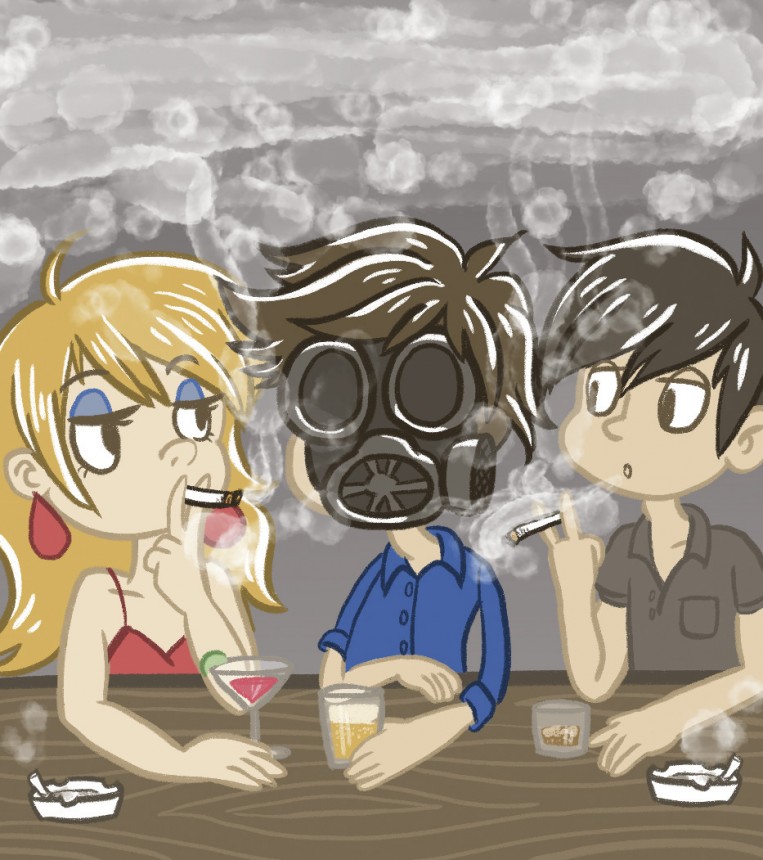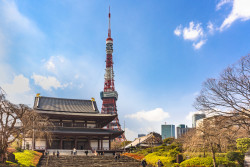
October 5, 2014
Smells Like Nicotine Spirit
When others’ smoking sends you fuming
Imagine walking into a restaurant, taking out a small stick of pleasant-smelling incense—and not even a very strong-smelling one—placing it on the table, and lighting it. As the subtle smell wafts from table to table and people notice, eventually there will be complaints, and the staff will come over and tell you to put it out.
However, if you hold it in your mouth, then it’s fine.
That’s basically the logic behind smoking. It doesn’t matter if you think it smells good or bad, or if you’ve smoked to the point you’ve forgotten that it even has a smell. It’s a smell the people around you didn’t choose. When you smoke, you not only make people smell it—you make it so they walk away smelling of it.
Smoking is more obnoxious and yet somehow more forgivable than farting. Spend a night in a club or at a party, and over the course of that night, everyone in there will probably have released silent but deadly fumes at least once. You may or may not happen to smell it when it happens, but you won’t go home, pull off your shirt, and be struck by how the smell of other people’s gas is now infused into the fabric, forcing you to throw it into the wash. With smoking, somehow that has become an acceptable standard of going out at night.
It’s a strange exception that exists—or has existed—the world over, and is especially odd in Japan, which lags developed nations in curtailing the degree to which a stranger can sit beside you and make you smell. Tokyo has more Michelin three-star restaurants than any other city, but also more opportunity for that food’s flavor to be seasoned with a hint of burnt tobacco. A few places, such as Starbucks or microbrew specialty bars like the Taproom or Goodbeer Faucets, don’t allow smoking because it affects the taste of their products. The converse must also hold true: that any place that allows smoking doesn’t care about the taste of its food. Think about that when you’re sitting in the nonsmoking section, which is every bit as effective as a non-peeing section in a pool.
It’s especially odd in Japan, which has historically valued bathing and cleanliness. The first Europeans to arrive in Japan were in the habit of bathing about once a week, and it might even have been preferable to smell a little more like nicotine than your average 16th-century European citizen. Japanese people, however, have long held cleanliness in high regard, and still do. Look into the bathroom of a lot of women—and more than a few men—and you will see an array of products with delicately concocted scents. Your average socialite emerges for a night on the town with all of a human’s naturally unappealing odors washed away and replaced with finely crafted appealing scents. Then, within minutes of arriving at their destination, that effort is completely negated as they bathe in eau de ashtray.
Whether or not Japan legislates smoking like other nations might become irrelevant, as the future seems to be in “vaping”—using small electronic “e-cigarettes” to create water vapor infused with various scents and flavors, tobacco being one of them. I haven’t been around enough people who “vape” to be sure if the water vapor imposes the same clinging odor as regular tobacco, but I’m not looking forward to the experiment of standing in a room where everyone has a different smell and seeing how the combination ends up making me stink in an infinite variety of combinations. [pullquote]E-cigarettes are supposedly healthier than regular cigarettes, but that, to me, is solving the wrong problem.[/pullquote]
Usually, when people complain about smoking, they focus on the health issues: the secondhand smoke, the cost of medical care for lifelong smokers and that sort of thing. I don’t care about any of that. I don’t care if any of your hobbies result in your prolonged miserable death or not. Your body, your choice. I just don’t want you to make me smell like your crappy habit. The same way that I don’t care if you urinate—but I do care if you urinate on me.







